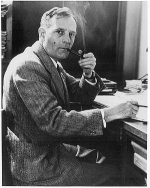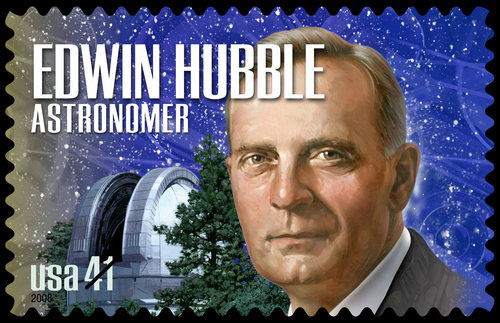Edwin Hubble and The Big Bang Theory
Edwin Hubble was an American astronomer known for his significant contributions to the field of observational astronomy and his role in establishing the field of extragalactic astronomy. Hubble’s work revolutionized our understanding of the universe and its origins, and he is widely regarded as one of the most influential astronomers of the 20th century.
Hubble’s career as an astronomer began in earnest in 1919 when he joined the staff of the Mount Wilson Observatory in California. It was here that he made a series of groundbreaking discoveries using the observatory’s 100-inch telescope, then the largest in the world. Hubble’s observations of Cepheid variable stars in the Andromeda Nebula allowed him to determine that these stars were actually located outside of our own Milky Way galaxy, confirming the theories of other astronomers such as Vesto Melvin Slipher and Heber Doust Curtis.
Building upon the work of other astronomers, Hubble also made precise measurements of the redshift of galaxies, which led to the formulation of what is now known as Hubble’s law. This law describes the relationship between the distance to a galaxy and its recessional velocity, and it provides strong evidence for the expansion of the universe. In fact, Hubble’s observations showed that the universe is not static, as was previously believed, but is instead undergoing a continuous process of expansion.
Hubble’s work had a profound impact on the field of astronomy and beyond. His discoveries fundamentally changed our understanding of the universe and its history, and they provided crucial support for the theory of the Big Bang. Hubble’s law and his determination of the age of the universe also had far-reaching implications for other fields of science, such as geology and biology, as they required a reevaluation of the age of the Earth and the origins of life.
In addition to his scientific contributions, Hubble’s legacy also includes his role as an educator and author. He was a prolific writer, publishing numerous scientific papers and articles throughout his career. Hubble also served as a mentor to many young astronomers, inspiring them with his passion for the cosmos and his dedication to the pursuit of knowledge.
Who is Edwin Hubble?
Edwin Hubble (1889-1953) was an American astronomer known for his significant contributions to the field of observational astronomy and his role in establishing the field of extragalactic astronomy. Hubble’s work revolutionized our understanding of the universe and its origins, and he is widely regarded as one of the most influential astronomers of the 20th century.
Hubble’s career as an astronomer began in earnest in 1919 when he joined the staff of the Mount Wilson Observatory in California. It was here that he made a series of groundbreaking discoveries using the observatory’s 100-inch telescope, then the largest in the world. Hubble’s observations of Cepheid variable stars in the Andromeda Nebula allowed him to determine that these stars were actually located outside of our own Milky Way galaxy, confirming the theories of other astronomers such as Vesto Melvin Slipher and Heber Doust Curtis.
Building upon the work of other astronomers, Hubble also made precise measurements of the redshift of galaxies, which led to the formulation of what is now known as Hubble’s law. This law describes the relationship between the distance to a galaxy and its recessional velocity, and it provides strong evidence for the expansion of the universe. In fact, Hubble’s observations showed that the universe is not static, as was previously believed, but is instead undergoing a continuous process of expansion.
Hubble’s work had a profound impact on the field of astronomy and beyond. His discoveries fundamentally changed our understanding of the universe and its history, and they provided crucial support for the theory of the Big Bang. Hubble’s law and his determination of the age of the universe also had far-reaching implications for other fields of science, such as geology and biology, as they required a reevaluation of the age of the Earth and the origins of life.
In addition to his scientific contributions, Hubble’s legacy also includes his role as an educator and author. He was a prolific writer, publishing numerous scientific papers and articles throughout his career. Hubble also served as a mentor to many young astronomers, inspiring them with his passion for the cosmos and his dedication to the pursuit of knowledge.

What did Edwin Bubble discover?
Edwin Hubble’s discoveries are the expansion of the universe and the existence of other galaxies beyond the Milky Way. He made these discoveries by observing and measuring the redshift of galaxies, which revealed that they are moving away from us and that the universe is expanding. Hubble’s discoveries revolutionized our understanding of the cosmos and laid the groundwork for the development of the Big Bang theory.
What telescope did Edwin Hubble use?
Edwin Hubble used the Hooker Telescope, which is a reflecting telescope with a 100-inch aperture and a focal length of 100 inches (2.5 meters). The Hooker Telescope is located at the Mount Wilson Observatory near Los Angeles, California. Hubble’s use of the Hooker Telescope led to the discovery of the Andromeda galaxy beyond the Milky Way. The Hooker Telescope was the world’s largest at the time of Hubble’s research and was in operation for 32 years.
Did Edwin Hubble create the Hubble telescope?
Edwin Hubble did not create the Hubble Space Telescope, but his work and discoveries greatly influenced its development and mission. As an esteemed astronomer and cosmologist, Hubble made significant contributions to observational astronomy, particularly in the study of galaxies and the expansion of the universe.
One of his notable achievements is the discovery of the expansion of the universe, which he accomplished by using the 100-inch Hooker telescope to observe galaxies and measure their redshift. This discovery, known as Hubble’s Law, provided a fundamental understanding of the universe’s expansion and paved the way for the development of the Hubble telescope.
Hubble also played a crucial role in the development of the Hubble constant, a value that quantifies the rate of the universe’s expansion. His meticulous observations and calculations using Cepheid variable stars helped establish a more accurate estimate of the Hubble constant, which in turn guided the design and capabilities of the Hubble telescope.
Beyond his direct contributions, Hubble’s legacy and impact on the field of astronomy inspired scientists and engineers involved in the creation of the Hubble telescope. His relentless pursuit of knowledge, groundbreaking discoveries, and commitment to advancing our understanding of the cosmos served as a guiding light for the mission and goals of the telescope.
The Hubble Space Telescope was a collaborative project between NASA and the European Space Agency. It was launched into low Earth orbit in 1990 and remains in operation. The Hubble Space Telescope was named in honor of Edwin Hubble, recognizing his significant contributions to the field of astronomy and our understanding of the universe. The Hubble Space Telescope has made many important observations since its launch, including determining the rate of expansion of the universe, observing distant galaxies and black holes, and studying the atmospheres of extrasolar planets. The Hubble Space Telescope has undergone multiple servicing missions to repair and upgrade its systems, ensuring its continued operation and scientific productivity. These missions were carried out by astronauts using the Space Shuttle.
Why was The Hubble Telescope named after Edwin Hubble?
The Hubble Telescope was named after Edwin Hubble to honor his contributions to astronomy and cosmology and to highlight the importance of scientific exploration and discovery. Edwin Hubble was a pioneer in observational astronomy and is widely regarded as one of the most influential figures in the field. He revolutionized our understanding of the universe and developed the Hubble classification system for galaxies.
The Hubble Space Telescope’s ability to capture high-resolution images, study the morphology of galaxies, and make precise measurements of distant objects reflects the legacy of its namesake, Edwin Hubble. Edwin Hubble was known for his meticulous observations and precise measurements, which he used to make groundbreaking discoveries. The Hubble Telescope continues this tradition by providing astronomers with a wealth of data that allows them to explore the cosmos in unprecedented detail.
Furthermore, the naming of the Hubble Telescope after Edwin Hubble underscores his role as an influential figure in astronomy and his dedication to advancing our understanding of the universe. It serves as a reminder of the importance of scientific exploration and the profound impact that individuals can have on the field of astronomy.

